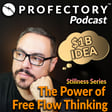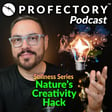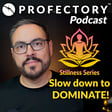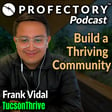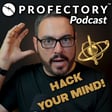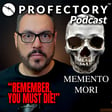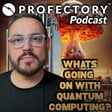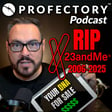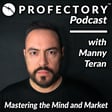Become a Creator today!Start creating today - Share your story with the world!
Start for free
00:00:00
00:00:01

Molly Gravatt: Transforming technical staffing with Grit and Grace
In this episode of The Profectory Podcast, I’m joined by Molly Gravatt, CEO of Radiant Dev, to uncover the story behind the story of her career. From navigating the challenges of entrepreneurship to empowering engineers and businesses with the right talent, Molly shares golden insights on resilience, AI in staffing, and overcoming bias in hiring.
💡 Key Insights:
- How vulnerability and authenticity create lasting relationships.
- Why removing bias in hiring leads to unexpected success.
- The impact of AI and technology trends on the future of work.
🎧 Watch now to gain actionable advice from Molly’s journey
#ProfectoryPodcast #MollyGravatt #TechStaffing #Entrepreneurship #AI #Leadership #CareerSuccess #StartupJourney #BusinessWisdom #Podcast
Transcript
Introduction to The Prefectory Podcast
00:00:04
Speaker
The Prefectory Podcast, Mastering the Mind and Market. Hosted by Manny Turan, we explore what it takes to succeed both in business and within yourself.
00:00:15
Speaker
From a strategy and business growth to mindset and resilience, we provide the tools to lead with clarity, confidence, and wisdom.
Meet Molly Gravat: Founder of Radiant Dev
00:00:32
Speaker
Welcome to the show. In today's episode, we have a special guest. We have Molly Gravat, who is the founder of Radiant Dev. And there's some exciting things we'd like to talk about with ah with her background, where she came from, and really to understand the story behind the story.
00:00:50
Speaker
So without further ado, Molly, welcome to the show. Thank you very much. It's a pleasure to be here, Manny.
Challenges in Business Mentorship
00:00:57
Speaker
Great. So, you know, a lot of people that are in business today are really don't have a lot of mentors. They look online, they look at books, they look at friends, and they kind of piece together mentorship.
00:01:09
Speaker
And our audience really spans across many industries, whether it be your industry or maybe it's something more retail or maybe government or B2B. And so tell us a little bit about your background, Molly, sort of what your business does.
00:01:24
Speaker
And then after that, we'll kind of dive into your background. Perfect. Perfect. um So yes, Radiant Dev is my company, and we are focused on technology staffing. So for us, that means we are helping clients with hiring, oftentimes with engineering in the technical sector, software, DevOps, project program management.
00:01:48
Speaker
and essentially we're in the people business on both sides. So we're recruiting candidates on one side, and on the other side, we're working with customers to help build out high-performing teams of engineers and key players at the core level.
00:02:04
Speaker
Yeah,
From Volleyball to Staffing: Molly's Journey
00:02:05
Speaker
that's fascinating. And having run and currently running a ah technology business, I know that The number one thing behind, of course, the customers that's the most important is the people because the people make the business.
00:02:17
Speaker
People are the ones that do all the stuff and make things happen. And so this is kind of an interesting a line of work. What led you to to start the business? Such a great question. um You know, I think it it is an interesting one that i I like to ask people as well when they start in to the industry.
00:02:37
Speaker
a lot of times it's on accident. I feel like it is becoming more common as a profession over the last 15 years. um But when I started, it was still relatively new. So when i stepped into this role, I had... um come from, i played volleyball in college and i coached for a year K-State in Manhattan and then decided i didn't want volleyball to be my entire life.
Growth Mindset and Networking
00:03:08
Speaker
And so it was through an introduction that I got referred into the industry and thought, This seems cool. I like the people that I would be working with and I would knew nothing about technology, but I figured the worst that would happen is I would work with great people and I would be interacting with so many equal cool companies that I would have the ability to land a job. That was my thinking when I started.
00:03:34
Speaker
um Luckily, I jumped in and and did well and and the rest is history. Well, I love your mindset of the worst that can happen. That's something that I use all the time in you know my career is like, what's the worst that can happen?
00:03:49
Speaker
The worst that can happen is I can grow and increase my network and become a better person. If that's the worst that can happen, I mean, the sky's up from there. 100%.
Career Impact and Relationship Building
00:03:59
Speaker
So it sounds like you were potentially, you were in a corporate role doing staffing and so forth.
00:04:06
Speaker
And how long did did you do that? So yes, I was part of a large organization. So they're they're one of the big ones in the industry. Aerotech, Tech Systems, Allegis Group is the big parent company.
00:04:21
Speaker
And i was with them for about 10 years and worked my way up from recruiting, you know just working with the candidates, understanding their business and helping bring them to the table for the customer.
00:04:37
Speaker
um And where my sweet spot is building relationships, getting to know people, understanding what's important. And um that led me into sales where I just fell in love. I love everything about it, the challenge, the um ah competitiveness and the ah just the ability to make a difference, right? For the customer, the people that they hire, and this is still true today, and part of the reason I still love it is that when you when you bring great people to a team, the dynamic changes. it's actually true either way. If they're good or bad, the dynamic of the organization changes, and um those people can be catalysts and game changers, or they can be favorable for the organization.
00:05:28
Speaker
So um I learned early that What we do in this industry does make a difference and the chance to make a positive impact on the engineers and consultants that we place is also huge, right? They can go from a lower a paying job or not having a job to earning very well for themselves and their
Entrepreneurship and Personal Connections
00:05:55
Speaker
family. So um pretty cool stuff.
00:05:58
Speaker
That's great. I do want to go into some of the more nitty gritty nature of how that works. If they become a gig worker, are they a 1099 and how that works. But I first want to ask, well, first want to say this, that sales is one of these things that historically has a negative connotation.
00:06:16
Speaker
Yeah. and And the more, I mean, I grew up in a small business family. We all had, my mom had a small business, my grandmother And so it wasn't really part of, these are all restaurants. So sales for a restaurant is just, is more on the advertising and marketing side.
00:06:32
Speaker
You're not out there getting people inside the door per se. But what I did learn when I became a sales guy after my engineering career is that just like you said, the connection, the people, the impact you make is is fantastic. and And so with that, let me ask you this.
00:06:49
Speaker
So you're doing this for 10 years. you were working for one of the big companies and there must've been a ah point in time or a moment or a situation where, that led you to make that jump from a an employee to an entrepreneur, business starter, business owner. What was that all about?
00:07:11
Speaker
ah I mean, this would need five episodes. Okay, I love it. um But the shortened, condensed version is that I went through a divorce, um and there were so many things during that time that shook who I was as a person. And, you know, that the phrase that through much therapy, but but I learned what is supposed to be, right? I had all these preconceived notions about how life is supposed to go and what is supposed to be. And the truth is, there's no such thing. Life is what you make it and the choices and the decisions that you make.
Facing Entrepreneurial Fears
00:07:53
Speaker
And so, During that time, I questioned everything and said, you know, is this and that what I want to do And I'm fortunate that my partner, my my husband now, who i met through through that discovery process,
00:08:15
Speaker
um was and continues to be my biggest supporter. And he was the one that said, know, You seem like you're unhappy in, in this path, right? You're doing well, but you're not loving it. Like you're used to why don't you start your own thing?
00:08:33
Speaker
And it was such an aha moment and one that I don't know that I ever would have gotten to on my own. Um, he had gone through many startups and opportunities growing up. Um, he's an engineer and, uh,
00:08:50
Speaker
Like i said, he's my biggest fan. So I'm lucky to have him in my corner. And we talked about what, again, what's the worst thing that can happen. and He was earning well and said, if you fall down, what if you just have to go get another job?
00:09:03
Speaker
would Would that be so horrible? um And ah that is with the biggest turning point. And I'm you know i'm glad i glad I said yes.
00:09:16
Speaker
Yeah, that's really fascinating that a lot of people ah think that entrepreneurship is, although it does feel lonely at times, it isn't something that you start alone and you need to have a network of people and support is big time.
00:09:31
Speaker
Yeah. And I too started my entrepreneurial career as a kind of a, um I wouldn't call it a mistake, but kind of by accident. That's a better word.
00:09:42
Speaker
Yep. I had a corporate job. I was building a new division of a company. I moved back to Tucson, my hometown, if you will. And um this is back in 2009. The economy was going down and spirals and- yeah There was no super high paying job in Tucson like I had before. And I said, what am I going to do?
00:09:59
Speaker
And my wife at the time said, look, what's the worst that can happen? we We took that step forward and i and then I started my company as Tara and I grew it and and then it failed. And so all that are life lessons. And so that's that's fantastic.
00:10:13
Speaker
yeah And I still want to get to the nitty gritty, but I just had something else pop in my mind. Okay. Okay. Say you could whisper in your ear, during that transition of wanting to, or maybe maybe month one of doing this on your own when there's fear is outweighing confidence and and maybe the phone isn't ringing or the emails aren't coming in as much as they they are now and all that. So what would you tell yourself back month one of having started Radiant Dev?
00:10:47
Speaker
Oh, man. Yeah. First of all, i I spent many, many a day and evening prying in that basement office because it and it was hard. And, you know, on twitter to entrepreneurship is hard.
00:11:03
Speaker
You know, it's it's a crazy, wild ride. But if I had the ability to go back, um
AI, Work Trends, and Staffing Industry Changes
00:11:11
Speaker
I would, you know, I would tell myself to remove the...
00:11:18
Speaker
um just the preconceived notions, right? The thing I i spent the most time on early is a little bit embarrassing. I was worried about the presentation of the company and who I was, right? I was worried about business cards. I was worried about the story and the messaging. And those are important things, right? To have your have your pitch ready and presentable, but it's so much less important than on the sales side, right? Connecting and being authentic and getting to know people. And guess what? Sharing your story and your vulnerability is sometimes your biggest strength. And so if I could go back and ah guide myself in that regard, um that's what I would, that's the recommendation I would have.
00:12:13
Speaker
That's fantastic. And you know this is, in a way, you're you're whispering to the ear of of countless people right now that might be struggling in that domain. you know There's that great book, um Think you Grow Rich, and there's a story about Three Feet from Gold about this guy that was digging a mine and he invested all his life savings in getting all this equipment. And he was digging and digging and digging and he got basically three feet from gold and he quit.
00:12:39
Speaker
yeah And then he sold all everything else. And then somebody came out in and dug three feet and found a whole vein of gold. and And so that's golden, Molly. That's super golden. And so we really appreciate your vulnerability.
00:12:50
Speaker
um That's one thing also that I have to say about the people in my personal network, the ones that connect with me and vice versa. and I would include you in that, we become friends, is that level of vulnerability. And that, in my opinion, is has its own form of currency.
00:13:07
Speaker
you know And we with that, you're very wealthy and abundant, ah not only on the financial side, but just your ability to connect. So that's amazing. Yeah. but So we talk a lot about trends.
Radiant Dev's Approach to Staffing
00:13:20
Speaker
We talk about a lot of, of these big market drivers like AI, like the gig economy, like connectedness, the environment, demographics.
00:13:30
Speaker
We can spend episodes upon hours talking about trends, but I think your, your business is interesting because it, I want to understand how, how AI plays into your business.
00:13:42
Speaker
I want to understand how demographics play in your business. And my first question has to do with with the gig side. Are the people you place, are they gig workers or do they become W-2 or how does that work?
00:13:55
Speaker
Yep. Great question. um So for the way that we run our business, um when we put people to work, they are either on our W-2 they are, if they have their own 1099, certain percentage of um we employ a certain percentage in that fashion. um And it it really mostly depends on their preference.
00:14:28
Speaker
um Sometimes it depends on whether or not we're lined up to do business in that state and whether or not we want to take on that additional responsibility from ah you know a tax and overhead perspective.
00:14:41
Speaker
um So there's there's a few different factors that come in. With with The gig economy or gig workers, there's hardly any of that. So every once in a while, we have a client that comes in and says, hey, we have some fractional work that needs to happen.
00:15:00
Speaker
um But it's still consistent, right? It's not like, okay, five hours this week and... 40 hours next week. It's more defined upfront in the way that it is um needed and expected.
00:15:16
Speaker
And that's the way we carry out the yeah the relationship. So, okay. Yeah. i I've been in my former career as a a sales engineer, technical sales manager kind of person. I was recruited once by a head hunter And i want to I want to go back to that term in a bit.
00:15:37
Speaker
yeah um But I had an experience being on, and I've also worked with agencies um similar to yours. I think yours is is probably much better than what I dealt with, but those were very transactional. They were they were much more interested in in the nuts and bolts and they didn't have any interest in in, the life of the person. They just wanted to know, okay, what are the, what do you need?
00:15:58
Speaker
And here they are, here's what we're going to present to you. And sometimes they try to shoehorn somebody that wasn't a really good fit. So I want to get to that as well. Cause that was very annoying. I said, no, no, I need these skills. Well, what about this guy?
00:16:10
Speaker
But, um, one thing I would say is like, you are doing a big service to these organizations and, and you're building a lot of, of, um,
00:16:22
Speaker
You're enabling technology growth and transfer, which is amazing. um So what about AI? Is that something that is pervasive in your market? Yep. Yep.
00:16:34
Speaker
We are seeing more and more AI popping up and we're, we're using it ourselves. So, um,
00:16:44
Speaker
It's interesting. We need to do more, i think, and to educate ourselves more internally on how we can use some of the AI tools. um We met with a client last week that was talking about how they went in and like there they're really eating the AI dog food and and doing everything AI, you know, i building out there ah you know their, know, their marketing campaign, their, know, their pitch deck to, you taking their pictures and all all the things, right? um Building their logo, literally everything.
00:17:18
Speaker
um For us, we we do work within the technology sector.
AI Integration and Industry Efficiency
00:17:26
Speaker
And on one side, it's med device, biotech, healthcare is one of our big lanes. And then the other is aerospace and satellite imagery.
00:17:37
Speaker
And then a few others in the middle, right? So when the customer is, ah you know, a good one, a good partner to work with, we say yes. And so for us, that means we're always learning um and we can't be an expert in all things. So if there's a new opportunity that comes in that we need to learn about, we're using ChatGPT to understand What are some smart questions that we can ask? How do we how do we get to know that specific skill set and vertical and what is meaningful and important? So it shortens guessing cycle as we go about identifying talent and talking with people in a way that is meaningful, both on the customer side and the consultant side.
00:18:24
Speaker
um You know, sometimes we will build out um materials around what is what is appropriate in a new market, right? we We sometimes get asked to perform in markets that we're not currently working in. And so we need to do some due diligence around, you know, what,
00:18:45
Speaker
and you know how do we utilize the proper tools and we we go and do our research and then we chat gpt to see what other answers come up so that's the biggest one today um but a lot of companies are using ai in our industry to do initial and initial sales outreach and initial recruiting outreach um And people are using AI tools to apply and to better their resumes, which makes things really interesting ah when you get 300 applicants in 20 minutes to a posting that you put out.
00:19:22
Speaker
That is crazy. How long have you had Radiant, by the way? So Radiant is three years old. So i I built a company previously and sold that off. And this is this is my second go around.
00:19:33
Speaker
so Okay. So you've been in in the staffing industry 15 plus years? Yes. Yes, I have.
Workforce Demographics and Diversity
00:19:42
Speaker
Do you, and this is this goes to that demographics question, how do you see the differences in in on both sides, both the companies you're working with hu and the people that are applying or that you're working with to place, like the actual people?
00:19:59
Speaker
How much have you seen change demographically in the past 15 plus years? Are you seeing... Older people, younger people, obviously the whole remote work stuff is is massive now as well.
00:20:11
Speaker
Tell me about all that. Oh, gosh. um Yeah, I do think the... it's just the entire landscape is changing, right? And so when you talk about demographics, um for sure, there are ah there is a large percentage of the workforce that is working longer. We don't have the retirement plans, the pension plans, all the things that were in place, and we're
00:20:43
Speaker
you know Cost of living is more expensive and um and people want to work. it It's meaningful and engaging and keeps you sharp. And so i think the biggest thing that we have seen um is an education, right? Those...
00:20:59
Speaker
those The middle of the workforce is always appealing um on the client side because there's some experience and there's also room for advancement and longevity.
00:21:14
Speaker
And then there's education on both sides of, you know, especially for the companies to say, well, why would I want this person that has 30 years in their career to come in and do an individual contributor role?
00:21:29
Speaker
And the, you know, the response to that is, why not? What do you have to lose? You have somebody that has amazing experience that can help train the the less experienced workers um and bring them up. And then the same thing goes for those recent grads or, you know, I think c ah the other side of that is that the, you know, the recent grad is not as ah as much of a checkbox as it used to be, right? You don't have to graduate college to be able to jump in and do a great job in a high-paying role with ah with
Bias in Hiring: Focusing on Potential
00:22:10
Speaker
a great company. So don't know that fully answered the question, but it is there's still a lot of movement met within the
00:22:20
Speaker
um within the workforce and the demographics and how to Just bring great people together without having those biases around their, you know, their, their, their age, their ethnicity and everything else.
00:22:38
Speaker
Right. That's ah the B word. I love the B word. Removing bias and how, how really detrimental it can be. to a leader's vision and i myself have uh in my previous position leading my company i helped i basically faced bias both personally as well as some of my managers would yeah would not hire somebody because they were outside of their little beautiful box yeah they were too old or too weird or too young or too this or too that and i would always
00:23:13
Speaker
say, well, why don't we just forget about the presentation and look at the substance? What is the substance? What can they actually contribute?
00:23:23
Speaker
And so that was a big shift for us. And it really helped me. I mean, we hired some people that were considered weird or out of the box yeah they ended up being amazing employees. So that was a really good Time for us.
00:23:37
Speaker
I like that. Let me ask this. So if, say for instance, I am well, I am ah the CEO of a company, but for instance, let's just use me. Say for instance, I have a need for an optical engineer with a really solid background in software.
00:23:55
Speaker
Okay. And mechatronics. I want them to be able to to take lenses and be able to use software to move the lenses and blah, blah, blah, and lasers and all that.
00:24:07
Speaker
Yeah. And I've got choices. I've got people that I know that are in the big boys and I've got you now in my in my network. Tell me, I guess sell me as to why Molly Gravatt as CEO of Radiant Dev should be written on my check when I transact the deal with you.
00:24:28
Speaker
All right. um So the the thing that that we use to set ourselves apart is what we hear from our customers, right? And which is our customers are our consultants and our business clients.
00:24:46
Speaker
And the thing that that we hear that we're excited about over and over again is that We do bring, you know, that personal touch, that white glove service to the table.
00:24:58
Speaker
We make the process simpler, easier, more manageable. um Everyone is so, so busy these days, right? And there are a thousand things to do. And You know, most people don't like to look at the cost and like, why am I paying you for this service? Well, what does it cost you if you don't hire this engineer?
00:25:23
Speaker
You know, and and they don't look at the work that's being picked up by all of the others that are staying later that are getting fed up with, you know, with with the extra work and lift and then also sometimes companies make their employees do the searching and you know it's a full-time job to find the talent that you need and going back to what i said earlier about how much of a difference that each hire can make is it's just so important and so
00:25:58
Speaker
That's the one thing on the client side. And on the consultant side, we we love it that we hear that they are not just a and name and a number, right? We help them prepare. We help vet and understand, you know, hey, this isn't going to be the right fit for you because of these five reasons.
00:26:19
Speaker
Let's keep in touch for something that will be a better fit for you. But when it
Globalization and Domestic Talent
00:26:24
Speaker
is, we help prepare them. We help and help them understand, show up, look your best, be your best, be early, take notes on, you know, what you think is going to be important and do your research up front.
00:26:39
Speaker
You know, they... they when people are looking for a job today, they're interviewing sometimes 20 times a month if they're lucky, right? And they are, it is it is seriously a full-time job for them and they feel like a number and like they don't matter. And we help give them a better voice and preparation for for the ah for the interview process and the opportunity at hand.
00:27:09
Speaker
That's a great answer and it's a great. um You sold me. i a ru shirt but Here it is. i got it right here written for you. I'll just go ahead and mail it for you. nice i There's also a trend right now towards less globalization, more nationalism.
00:27:24
Speaker
And i would, do you compete with the Upworks and the near sourcing and outsourcing, you know, Hey, hire an engineer from Pakistan, that that sort of thing.
00:27:39
Speaker
We have, i feel like work and business is so much about trends, right? You see things shift really far in one direction and then they swing way back in the other.
00:27:53
Speaker
And so there has been a lot of offshoring and outsourcing and nearshoring. Um, And more recently, we have, you know, when customers say that, we say, okay, why are you doing that?
00:28:11
Speaker
and And have them explain the reason behind it. And then we say, okay, if this is budget-based and you have the work that needs to be done, what if we look at u s And this can't always be the case, right? If you want people on site, and depending on location, there's some nuances to that, right? There's cost of living and wage equity that has to be
Bespoke Staffing Approach
00:28:37
Speaker
in place. But for a lot of the remote roles that we're working on within the software industry, we're challenging those customers to say, okay, if you have...
00:28:48
Speaker
$60 an hour or $90 an hour or whatever that number is for a specific skill set, let us go find you what you need for that rate and see what we can deliver as a comparison because there's a lot of people in remote or rural areas that, especially that moved during COVID and said, you know, they may be paid off a house and, you know, they're living within means that they want to live in and they're willing to work for less and they're grateful for that opportunity and it ends up being a win-win win for everybody so um so yes we are seeing some some variants we are not doing offshore or nearshore but we are competing in in a few different instances when customers agree to to go that path
00:29:44
Speaker
Yeah, that's good to know. And you know we talk a lot about value and value delivery. And i think the value that you're bringing to your clients on both sides is is pretty clear. While some people are going more automated, more robot, more nearshore, offshore, you're actually putting on that white glove, bespoke is another word that's been used, bespoke or boutique, right?
00:30:06
Speaker
um We're wrapping up here in the next couple of minutes, but I want to know, tell me a A juicy story. but Okay. You can redact it. You can change the names and all that. Tell me a story where where something went terribly wrong and you lost a big deal or you had a situation where a bluebird came out of nowhere and you were able to to throw a Hail Mary.
00:30:31
Speaker
Tell us something juicy. Yeah, yeah, yeah. So this is this is very early early days in my career. um and this was it was actually post-9-11, where things were so strange. And I was working with a very big telecom company, um and they were my only client.
00:30:58
Speaker
Because it was the way that the company had set it up. If you had some big clients, you were... meant to focus and farm and drill down to every single level within that organization.
00:31:10
Speaker
And so that was my baby. and I was called into into the office to meet with several of the engineering leaders.
00:31:23
Speaker
you know, managers, VPs, directors. And, you know, I sat at this table and i was so nervous. i met with all of them individually, but I was still, you know, I was in my twenties and, um, they said, we, we have to let all of your people go, but and which you meant, you know, all of my earnings were going out the window And, um, you know, and I, you know, I had to to take a deep breath and I just wanted to cry. Literally, I just wanted to cry at that table. And, um, I held this together and I said, okay, tell me why, where, you know, what does this mean?
00:32:09
Speaker
What are the end dates? What do we need to know? do you think things will open? You know, I got it together and, and ask some, some significant questions. Um, And then I went out of my car and cried.
00:32:20
Speaker
But the other side of that was was one of the biggest lessons in my career that I try to remember today. And, um you know, several others within my team and my office were impacted.
00:32:37
Speaker
um and somebody was like so angry about how. much they were losing. And I said, look at all of these people.
00:32:48
Speaker
So at my core, I'm the underdog and I like to fight for other people. I won't always speak up for myself, but so many people that we had just asked to relocate or that didn't have a job like we still had jobs right we were still earning we were still okay and i said we need to get it together but we have to give notice to these people and treat them with care and respect um and then the the fallout of that that's where i found my first leadership voice and then um
00:33:20
Speaker
you know, after the fact, remembering that how you care for people when you're not expecting something from them in in life and in business is so, so important. So, you know, building back up from that, you know, crash in, you know, in my earnings was a huge lesson. And um when i I try to keep in the back of my mind when I connect with people.
00:33:48
Speaker
Wow.
Closing Remarks and Gratitude
00:33:49
Speaker
That's, that's one hell of a story. but That's definitely the story behind the story. Yeah. So this has been a great pleasure. and We could, we could talk for another few hours, I'm sure. but I really appreciate your time, Molly, and and really being open and authentic with us and sharing some really good insights and the number of, of just nuggets of wisdom in this one podcast, this 35 minute podcast is immeasurable. So thank you so much for your time.
00:34:16
Speaker
Of course. Thank you for having me. I'm glad to be here and look forward to more interactions. Absolutely. Well, with that, Molly, we will talk to you soon and take care. See you. Bye.
